Smt K M Barta Rosemond APCS Deputy Collector is posted as Special Deputy Collector, Irrigation (LA), LPC, Tirupati.
IndianBureaucracy.com wishes Smt K M Barta Rosemond the very best.
Smt B Sudha Rani APCS Deputy Collector is posted as Special Deputy Collector, Irrigation (LA), GNSS Unit-I, Tirupati.
IndianBureaucracy.com wishes Smt B Sudha Rani the very best.
Shri Babloo Kumar IPS (Uttar Pradesh 2009), presently, Additional Commissioner Of Police, Goutam Budh Nagar, is transferred and appointed as Joint Commissioner Of Police – Crime & HQ, Police Commissionerate, Lucknow, Uttar Pradesh.
IndianBureaucracy.com wishes Shri Babloo Kumar the very best.
Solar Energy Corporation of India (SECI) Ltd under Ministry of New and Renewable Energy bagged the 3rd PSU Transformation Award under the “Innovative Product Development” category for ‘Firm and Dispatchable RE (FDRE) Supply to DISCOMs on a Demand Following Basis’. The award was conferred in a felicitation ceremony held on 05th December 2024 at New Delhi.
The award was received by Shri Sanjay Sharma, Director (Solar) along with Shri Joshit Ranjan Sikidar, Director (Finance) and Shri Sivakumar V Vepakomma, Director (Power System) in the presence of Shri Ajay Kumar Sinha, General Manager (Corporate Planning) and other officials of SECI.
SECI has introduced the innovative power supply model of Firm and Dispatchable RE (FDRE) working with several DISCOMs and States to understand their energy demands and design models that cater to their renewable power requirement.
Shri K Vijayakam APCS Deputy Collector is placed at the disposal of the Social Welfare Department for posting as Executive Director, SC Corporation, Srikakulam.
IndianBureaucracy.com wishes Shri K Vijayakam the very best.
Shri Dinesh Kumar P IPS (2009), presently, Additional Commissioner Of Police, Commissionerate, Ghaziabad, is transferred and appointed as Deputy Inspector General of Police (DIG) – Basti Range, Basti, Uttar Pradesh.
IndianBureaucracy.com wishes Shri Dinesh Kumar P the very best.
Union Minister of State (Independent Charge) for Science and Technology; Earth Sciences and Minister of State for PMO, Department of Atomic Energy, Department of Space, Personnel, Public Grievances and Pensions, Dr. Jitendra Singh assured the Rajya Sabha that India’s nuclear power plants are among the safest in the world, with stringent safety protocols and international oversight. Responding to a question on nuclear safety during Question Hour.
The Minister emphasized the rigorous safety protocols followed at every stage of nuclear plant development and operation, assuring the nation that India’s nuclear energy program is both secure and sustainable.
Dr. Jitendra Singh declared that safety is the cornerstone of India’s nuclear energy policy. “In the Department of Atomic Energy, we follow the rule of ‘safety first, production next.’ Every stage, from site selection to operational checks, is governed by stringent protocols,” he said. He outlined the extensive inspection regimen, which includes quarterly reviews during construction, semi-annual inspections after a plant becomes operational, and a mandatory five-year license renewal process.
India’s nuclear safety framework is further bolstered by international oversight. The World Association of Nuclear Operators (WANO) and other global bodies periodically review India’s facilities, reinforcing their safety standards.
Dr. Jitendra Singh highlighted evidence-based achievements in reducing radiation emissions, which he called a testament to the Department of Atomic Energy’s meticulous efforts. “Globally, the critical safety benchmark for radiation emissions from nuclear plants is 1,000 microsieverts. In India, our plants consistently operate well below this threshold,” he explained.
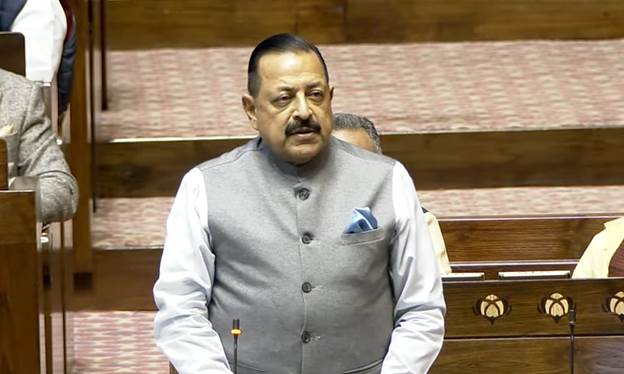
Dr. Jitendra Singh highlighted significant improvements in radiation levels, noting that, for example, at the Kudankulam plant, emissions have decreased from 0.081 microsieverts a decade ago to just 0.002 microsieverts today. Similarly, the Kalpakkam plant has experienced a substantial reduction, with levels dropping from 23.140 microsieverts in 2014 to 15.961 microsieverts in 2023.
India’s nuclear plants are strategically designed to withstand natural disasters such as tsunamis and floods. Dr. Jitendra Singh explained that facilities on the eastern coast are situated more than 1,300 kilometers from tsunami-prone zones in Indonesia, while those on the western coast, like the Tarapur plant, are positioned over 900 kilometers away from the nearest tsunami risk zone in Pakistan.In addition, plants are constructed above the highest recorded flood and sea levels to ensure safety even in extreme conditions.
Dr. Jitendra Singh also highlighted milestones that underscore India’s emergence as a leader in nuclear energy. The Kaiga Generating Station in Karnataka achieved an unprecedented 962 days of continuous operation, setting a global benchmark. Tarapur, India’s first nuclear power plant, has completed 50 years of successful operation, a remarkable feat in the global nuclear industry.
India’s first indigenous Pressurized Heavy Water Reactor (PHWR) is now operational at Kakrapar, Gujarat, showcasing the country’s growing self-reliance in nuclear technology. Additionally, the Kudankulam plant, which had remained stalled for decades, has been made fully functional under the current administration.
Dr. Jitendra Singh highlighted that India’s nuclear program extends well beyond power generation, staying true to Homi Bhabha’s vision of using atomic energy for peaceful purposes. He noted that nuclear technology is being effectively applied in diverse areas such as agriculture, where it aids in developing radiation-resistant crop varieties; food preservation, by extending the shelf life of perishable items; healthcare, through advanced cancer treatments and the production of medical isotopes; and security, by manufacturing protective gear for law enforcement personnel.
Addressing the debate on the Civil Liability for Nuclear Damage Act of 2010, Dr. Jitendra Singh explained that the current framework adequately safeguards public interests while ensuring a viable environment for foreign and domestic investments. The liability regime places the primary responsibility on operators, with provisions for supplier accountability under specific circumstances.
Dr. Jitendra Singh concluded by asserting that India, once perceived as a minor player in nuclear energy, has emerged as a global leader. “India is no longer just following global standards; we are now setting benchmarks that others aspire to achieve,” he said.
As the country pursues ambitious nuclear energy targets, including contributing to sustainable development and reducing carbon emissions, the government’s commitment to safety remains paramount. India’s progress in nuclear energy not only ensures domestic energy security but also positions the nation as a trusted partner in global energy and technology collaborations.
Union Minister for Environment, Forest and Climate Change, Shri Bhupender Yadav, informed the Nation about the notification of the Ratapani Tiger Reserve, Madhya Pradesh, as the 57th Tiger Reserve of the country. In a post on social media platform ‘X’, the Minister said, “Caring for conservation! We continue to make great strides in conserving our tigers. India has added 57th tiger reserve to its tally. The latest to join the list is Ratapani Tiger Reserve in Madhya Pradesh. As a country of nature lovers and worshippers, India offers the best habitat for the big cat. The feat is a result of the emphasis laid by PM Shri Narendra Modi ji on wildlife protection alongside economic progress”.
Ratapani Tiger Reserve has a core area of 763.8 sq km, buffer area of 507.6 sq km and total area of 1271.4 sq km. It is the 8th tiger reserve of Madhya Pradesh.
This conservation initiative will strengthen wildlife management in the forests of Ratapani, Bhopal Sehore area. Standard protection, habitat management, ecotourism, community engagement activities etc shall be adopted which will strengthen Wildlife conservation in the Ratapani Tiger landscape. The local communities will get the desired ecotourism benefits with this and it will help in development of the region.
Shri J Partha Sarathi APCS Deputy Collector is placed at the disposal of the Minorities Welfare Department for posting as District Minorities Welfare Officer, Prakasam.
IndianBureaucracy.com wishes Shri J Partha Sarathi the very best.
Atal Innovation Mission (AIM), under the NITI Aayog and the Office of Science & Innovation, at the Embassy of Sweden, in partnership with Nordic collaborators – Innovation Norway, Innovation Centre Denmark, and Business Finland, are pleased to announce the successful conclusion of SheSTEM 2024. This annual initiative celebrates the contributions of women in STEM and serves as a catalyst to inspire the next generation of innovators by encouraging young minds to explore careers in science, technology, engineering, and mathematics (STEM).
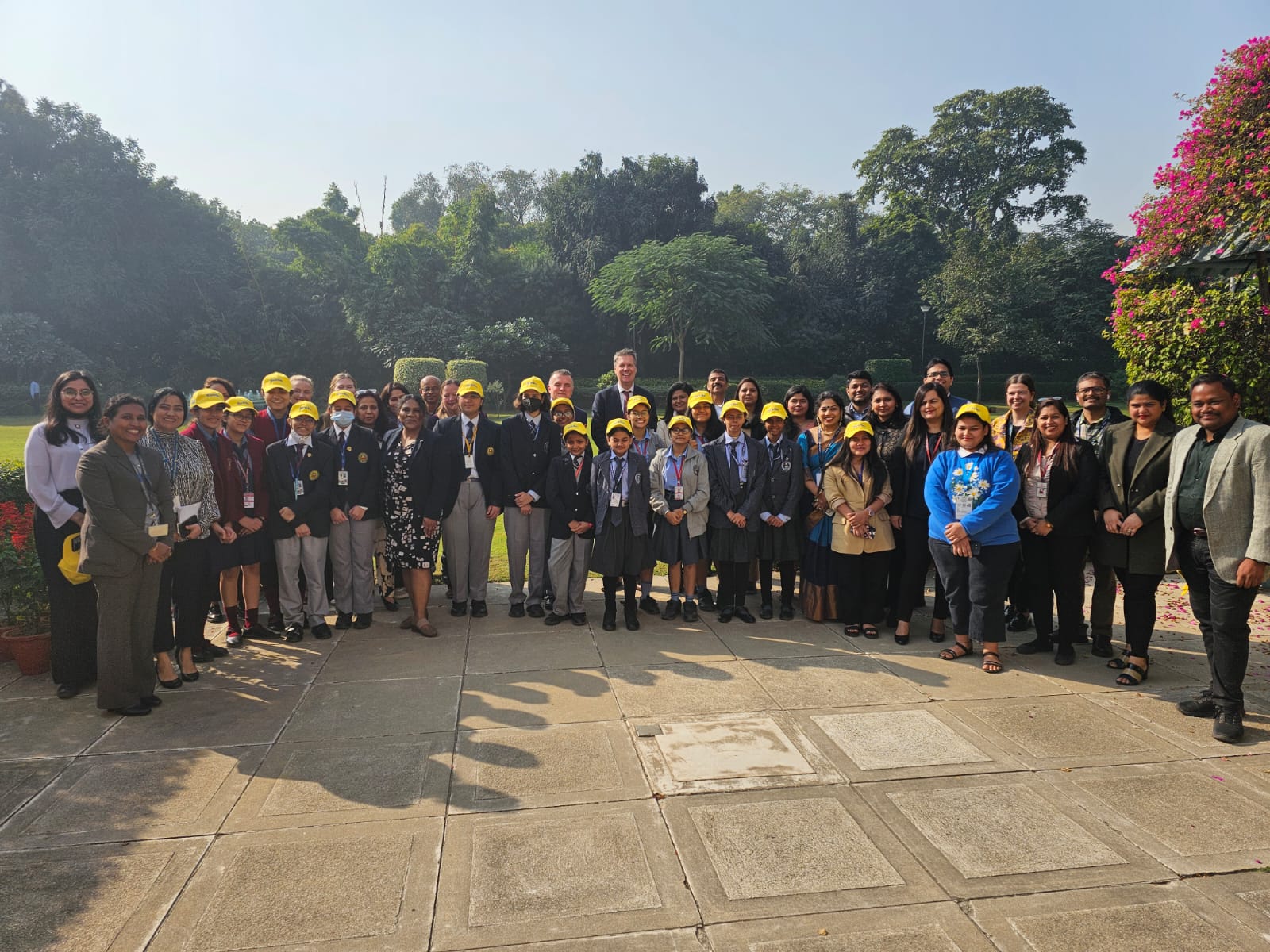
The SheSTEM 2024 challenge invited students from grades 6–12 across India to submit innovative ideas focused on Battery Technology and Energy Storage (BEST) systems. Part of the India-Nordic BEST project, the challenge aims to foster sustainability by advancing energy solutions. Participants were tasked with presenting their prototypes or concepts for energy storage and sustainability in a two-minute video format. The competition received an exceptional response, with over 1000 submissions demonstrating the creativity, problem-solving skills, and forward-thinking mindset of India’s youth. The ideas presented showcased the tremendous potential of young innovators who are poised to take on leadership roles in sustainability, technology, and science.
More than just a competition, SheSTEM 2024 provided a platform for students to engage with critical STEM topics and contribute to global sustainability efforts. The event highlighted the importance of collaboration and teamwork, underscoring the power of collective innovation in addressing today’s challenges.
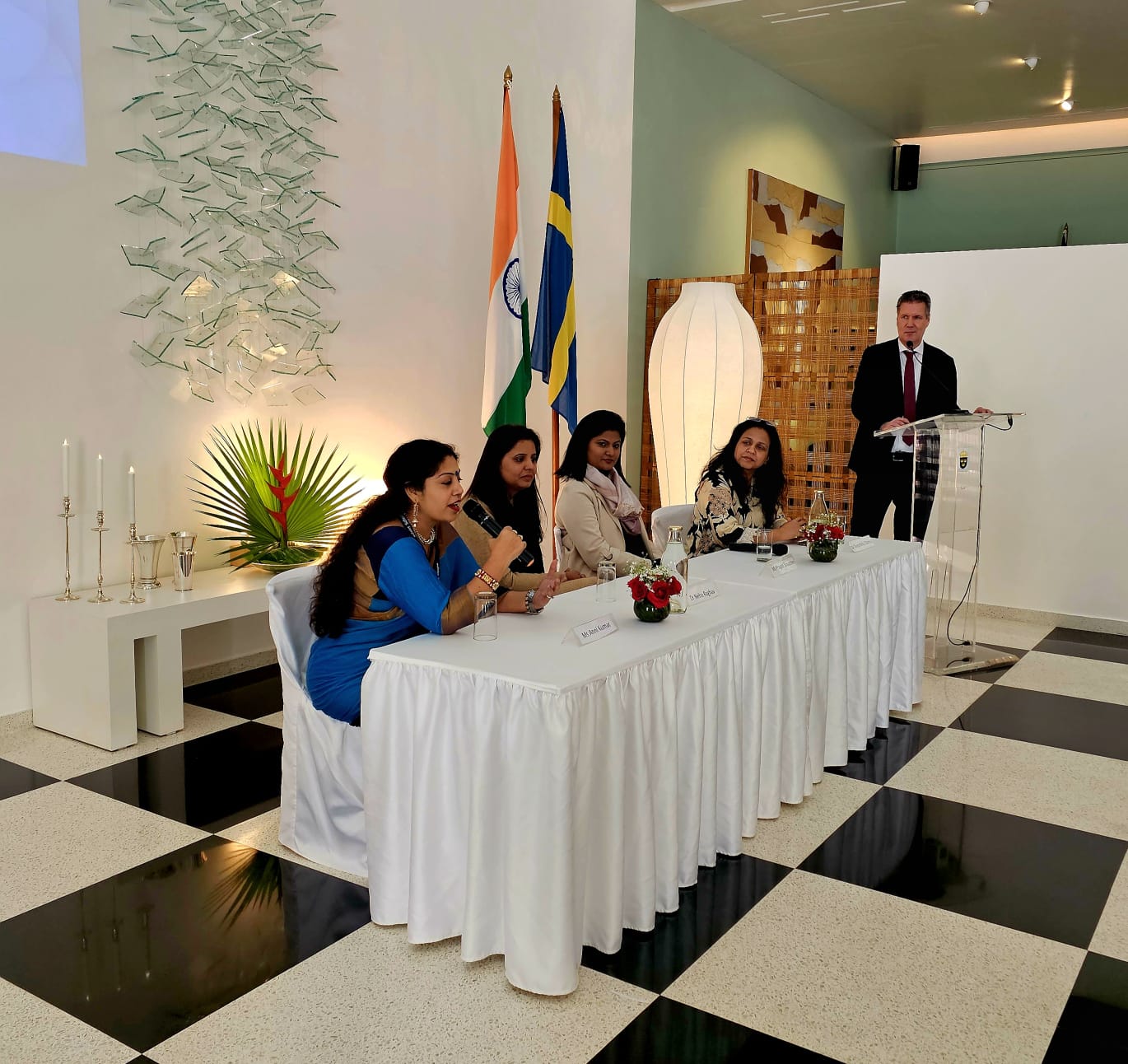
Ambassador of Sweden to India, Jan Thesleff expressed his views on the impact of SheSTEM 2024, saying, “Innovation and collaboration are at the core of a sustainable world, a world working hard to preserve itself. SheSTEM 2024 is a step in the right direction to help inspire the next generation to innovate and create solutions for energy storage and technologies. I am delighted that this year, the SheSTEM challenge is part of the India-Nordic Battery and Energy Storage Technologies project, bringing together the Nordic partners to explore areas of partnership with India across academia, business, and government.”
Mission Director, Atal Innovation Mission (AIM), Dr. Chintan Vaishnav emphasised the significance of the event, stating, “AIM is proud to be a part of SheSTEM 2024, a celebration of young talent, innovation, and the boundless potential of India’s students. This year’s challenge, focusing on energy storage and sustainability, directly addresses some of the most pressing global challenges. By involving students in this field, we are not only fostering future STEM leaders but also empowering them to play a significant role in shaping a sustainable and technology-driven world.”
The success of SheSTEM 2024 highlights the incredible potential of youth-led innovation and the pivotal role that STEM education plays in building a sustainable future. The event has provided a valuable platform for young minds to showcase their ingenuity, and AIM remains committed to supporting and empowering the next generation of thinkers, creators, and leaders.
Union Minister of Coal and Mines, Shri G. Kishan Reddy, launched the 11th round of Commercial Coal Mine auctions with a total of 27 coal blocks on offer at New Delhi.
These 27 coal blocks are spread across the states of Jharkhand, Odisha, Chhattisgarh, Maharashtra, Madhya Pradesh and Arunachal Pradesh and include both fully explored and partially explored mines including 1 coking coal mine. The Ministry has also executed 9 agreements with successful bidders of 10th round of auctions. These mines upon operationalisation will generate Annual Revenue of Rs. 1,446 crores calculated at PRC of these coal mines and will provide employment to approximately 19,000 people.
The Ministry of Coal has taken a series of reforms to ensure that the coal sector grows at a rapid pace and is able to meet the country’s energy needs. For 11th round also, Mines falling under protected areas, wildlife sanctuaries, critical habitats, having forest cover greater than 40%, heavily built-up area etc. have been excluded. The block boundaries of some of the coal mines where there was presence of dense habitation, high green cover or critical infrastructure etc. have been revised to improve the attractiveness of the coal mines.
Addressing the gathering, Union Minister of Coal and Mines, Shri G. Kishan Reddy, emphasized that coal remains the cornerstone of India’s energy landscape, asserting that power generation is unimaginable without it. He highlighted the transformative impact of coal block auctions in achieving energy security, fostering self-reliance, and reducing dependency on imports. Urging industry players to participate enthusiastically in 11th round of auctions, he called for collective contributions toward realizing the vision of an energy-independent Aatmanirbhar Bharat, as envisioned by the Prime Minister Narendra Modi.
Union Minister, Shri Reddy reaffirmed the Government’s dedication to boost domestic coal production to meet the nation’s energy demand. The Minister further reiterated the Government’s commitment to uplift local communities, emphasizing that coal auctions and mining activities go beyond economic growth. They also aim to empower communities by creating employment opportunities, improving infrastructure, and enhancing education and healthcare in coal mining regions. Shri Reddy expressed confidence that these reforms would position India as a global leader in sustainable mining practices while ensuring energy security.
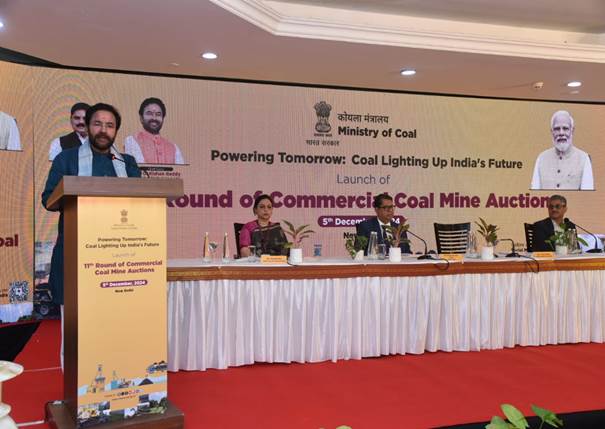
He also highlighted the Government of India’s Financial Incentive Scheme with an outlay of ₹8,500 crore to promote Coal and Lignite Gasification projects. This initiative, he noted, is a pivotal step toward achieving India’s ambitious target of 100 million tonnes of coal gasification by 2030. By encouraging cleaner and more efficient technologies, the scheme aims to reduce reliance on imported natural gas, lower carbon emissions, and pave the way for sustainable energy development.
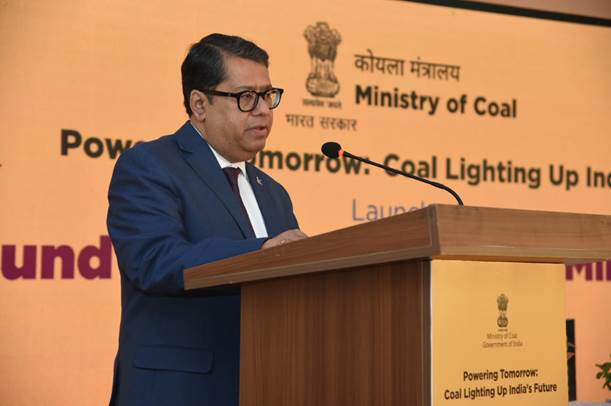
In his keynote address, Shri Vikram Dev Dutt, Secretary, Ministry of Coal highlighted the crucial role of policy reforms in creating an ecosystem that encourages innovation, reduces production costs, and meets the growing energy demands of the nation without compromising on environmental standards. Shri Dutt stressed that these reforms are designed to not only enhance coal production but also align the sector with India’s broader goal of achieving energy self-reliance and sustainable development. He further emphasised on inter-ministerial collaboration, particularly with the Ministry of Environment, Ministry of Power, and Ministry of Steel. He underscored how such cooperation facilitates the harmonization of policies, streamlines processes, and addresses sectoral challenges more effectively, enabling a balanced approach to energy security and environmental stewardship. Secretary, also spoke about the modernization efforts that are reshaping the sector, leveraging advanced technology to improve productivity, worker safety, and environmental management. He underscored the pivotal role of First Mile Connectivity (FMC) projects in expediting coal evacuation, ensuring efficient transportation, and reducing environmental impact. These initiatives, he stated, are crucial in driving the sector toward modernization and greater operational efficiency.
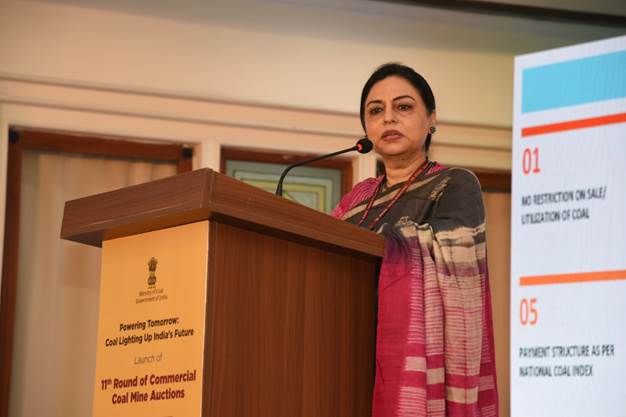
The Additional Secretary and Nominated Authority, Ministry of Coal, Smt. Rupinder Brar highlighted the need to explore more coal block as there is surging demand of coal. He stressed that leveraging private investment and expertise is crucial for meeting the growing energy needs and ensuring steady coal supply to various industries. By opening more coal blocks for exploration and encouraging private participation will contribute the coal sector in achieving higher production targets.
The commencement of sale of tender document shall start from today i.e. December 05, 2024. Details of the mines, auction terms, timelines etc. can be accessed on MSTC auction platform. The auction shall be held online through a transparent two stage process, on the basis of Percentage Revenue Share.
Power Grid Corporation of India Limited (POWERGRID), a ‘Maharatna’ Public Sector
Enterprise under Ministry of Power, Government of India, has signed a Memorandum of Understanding (MoU) with IIT Roorkee for a ₹20.73 crore Corporate Social Responsibility (CSR) contribution to foster technology innovation through establishment of three state-of-the-art Centres of Excellence (CoEs) at Institute Computer Centre.
MoU was signed in the presence of Shri. R. K. Tyagi, Chairman and Managing Director, Dr. Yatindra Dwivedi, Director (Personnel), Sh. Naveen Srivastava, Director (Operations), Shri Vamsi Rama Mohan Burra, Director (Projects), Sh. Vikram Singh Bhal, ED (CC-CMG), Sh. A. Nagaraju, ED(CSR & SR-I) from POWERGRID, Sh. Jasbir Singh, ED from CTUIL, Prof. K. K.
Pant, Director & Prof. Sateesh Kumar Peddoju, Head Institute Computer Center from IIT Roorkee and other senior dignitaries & officials from both the organizations.
Shri. Arvind Kumar Rai, Sr. GM (CSR), POWERGRID and Prof. R. D. Garg, Dean of Resources and Alumni, IIT Roorkee signed this MoU at Corporate Centre, POWERGRID for establishment of these Centres of Excellence (CoEs), which include a Command-and-Control Centre for campus UHS networks, an IoT Research & Application Centre, and a Lab for Cyber Security and Mobile Security Hackathons and awareness programmes. This initiative is expected to benefit nearly 11,000 on-campus students of IIT Roorkee and others, enabling cutting-edge research and development. IIT Roorkee, established
in 1847 is an institute of national importance imparting higher education in engineering, sciences, management, architecture and planning, and humanities and social sciences.
Corporate Social Responsibility is embedded into POWERGRID’s business model and is aligned towards United Nations Sustainable Development Goals. POWERGRID has been consistently contributing to the field of economic and social development across the country with its CSR initiatives.
As on 30th November 2024, POWERGRID has commissioned and operated 280 Sub-stations and more than 1,78,975 ckm transmission lines and 5,45,961 MVA of transformation capacity. With the adoption of the latest technological tools and techniques, enhanced use of automation and digital solutions, POWERGRID has been able to maintain average transmission system availability of 99.80%